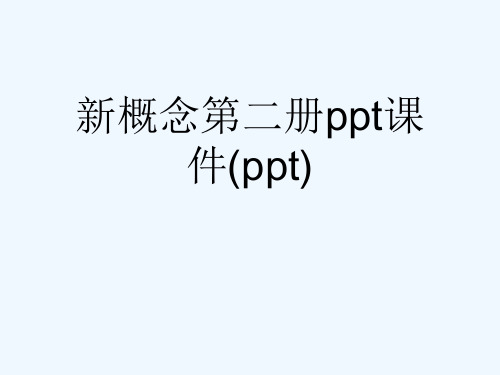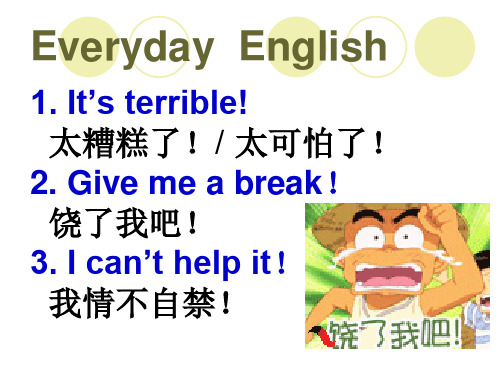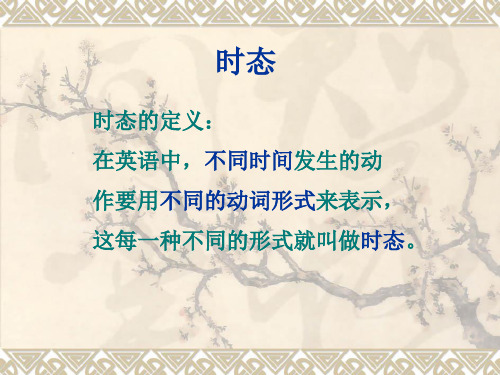新概念二册 课件
合集下载
新概念第二册ppt课件(ppt)

From there, he will 8._f_ly__ to Perth. My brother has 9._n_e_v_e_rbeen abroad before, so he is 10._f_i_n_d_i_n_g_ this trip very exciting.
■1. exciting adj.令人兴奋的, 令人激动的,振奋 人心的
这是多么令人兴奋的消息! What an exciting news this is!
That is an exciting book. 这是一本非常扣人心弦的书。
excited adj.(自己)感到兴奋的 We are very excited about this news.
-ed自己感到 interested, bored, -ing令人感到interesting, boring, I am interested in this book. This is an interesting book.
2.adj. 结实的,稳固的 firm muscles 这部小汽车非常坚固。 The car is very firm.
【补充学习】有关“公司”的表达: firm ;company;business;
■4. different adj.不同的—— same相同的 (1)不同的,相异的: be different from...与…不同 Desks are different from tables. My plan/idea is different from yours. We are planning something different this year.
受建议
• take还表示主动的“拿”、“取” • I received a beautiful pen from my uncle.
■1. exciting adj.令人兴奋的, 令人激动的,振奋 人心的
这是多么令人兴奋的消息! What an exciting news this is!
That is an exciting book. 这是一本非常扣人心弦的书。
excited adj.(自己)感到兴奋的 We are very excited about this news.
-ed自己感到 interested, bored, -ing令人感到interesting, boring, I am interested in this book. This is an interesting book.
2.adj. 结实的,稳固的 firm muscles 这部小汽车非常坚固。 The car is very firm.
【补充学习】有关“公司”的表达: firm ;company;business;
■4. different adj.不同的—— same相同的 (1)不同的,相异的: be different from...与…不同 Desks are different from tables. My plan/idea is different from yours. We are planning something different this year.
受建议
• take还表示主动的“拿”、“取” • I received a beautiful pen from my uncle.
新概念第二册ppt课件

After having spent whole mornings on the river, I always go home with an empty bag. after(conj.)+从句,从句主语必须是主句的主语才能换成下面 一种形式 after(prep.)+名词/动词的ing形式 After I go to school,I learned a lot of knowledge. After going to school,I learned a lot of knowledge. After the students handed in their papers, the teacher left.
Fishing is the writer’s favourite sport. Some unlucky fishermen catch old boots and rubbish. The writer is not so lucky. He never catches anything. He is not really interested in fishing. Sitting in a boat and doing nothing at all is the only thing that interests him.
2)v.+ing形式; 3) 它在句中其名词的作用,可单独或引起短语作主语,表语,
动词宾语,或介词的宾语以及定语。)
Subject
Instead of catching fish, they catch old boots and rubbish.
instead of 不做…而做… (可置于句首或句尾) without强调没有做某件事,instead of强调这件事没做成而做
新概念第二册ppt课件

• • • • • • • • • • • • private conversation theatre seat play loudly angry angrily attention bear business rudely adj. 私人的 n. 谈话 n. 剧场,戏院 n. 座位 n. 戏 adv. 大声地 adj. 生气的 adv. 生气地 n. 注意 v. 容忍 n. 事 adv. 无礼地,粗鲁地
• 以下短语中名词前不加冠词与加冠词意思有区别 • go to school 去上学; go to the school 去学校; • go to hospital去看病; go to the hospital去医院
3、I did not enjoy it. enjoy vt. 欣赏,享受,喜爱 ① enjoy +n. 喜欢,从当中得到一种享受(后面不能跟人) eg. I enjoy the music. enjoy the dinner\film\game ② enjoy oneself/代词 玩的开心 eg. We always enjoy ourselves. ③ enjoy +动名词 eg. Jane doesn’t enjoy swimming.
【课文讲解】
1、Last week I went to the theatre. • go to the +地点 表示去某地干什么事 • go to the theatre = go to the theatre to see a play去剧 场看戏 • go to the cinema =see a film 去电影院看电影
+ to sb. \ sth.
★business n. 事, 生意 • ① n. 生意 • businessman 生意人 • businesswoman • do business: 做生意 • go to some place on business:因公出差 eg. I went to Tianjin on business.
• 以下短语中名词前不加冠词与加冠词意思有区别 • go to school 去上学; go to the school 去学校; • go to hospital去看病; go to the hospital去医院
3、I did not enjoy it. enjoy vt. 欣赏,享受,喜爱 ① enjoy +n. 喜欢,从当中得到一种享受(后面不能跟人) eg. I enjoy the music. enjoy the dinner\film\game ② enjoy oneself/代词 玩的开心 eg. We always enjoy ourselves. ③ enjoy +动名词 eg. Jane doesn’t enjoy swimming.
【课文讲解】
1、Last week I went to the theatre. • go to the +地点 表示去某地干什么事 • go to the theatre = go to the theatre to see a play去剧 场看戏 • go to the cinema =see a film 去电影院看电影
+ to sb. \ sth.
★business n. 事, 生意 • ① n. 生意 • businessman 生意人 • businesswoman • do business: 做生意 • go to some place on business:因公出差 eg. I went to Tianjin on business.
新概念第二册ppt课件

Lesson 1 A Private Conversation
• private • conversation • theatre • seat • play • loudly • angry • angrily • attention • bear • business • rudely
2021/7/31
2021/7/31
★attention n. 注意
• Attention ,please. 请注意(口语) • pay attention 注意
• pay attention to … 对……注意 eg. You must pay attention to that girl.
• pay a little attention 稍加注意 • pay much attention 多加注意 • pay no attention 不用注意 • pay close attention 特别注意
剧场看戏 • go to the cinema =see a film 去电影院看电影
• 以下短语中名词前不加冠词与加冠词意思有区别 • go to school 去上学; go to the school 去学校; • go to hospital去看病; go to the hospital去医院
2021/7/31
adj. 私人的 n. 谈话 n. 剧场,戏院 n. 座位 n. 戏 adv. 大声地 adj. 生气的 adv. 生气地 n. 注意 v. 容忍 n. 事 adv. 无礼地,粗鲁地
★private adj.私人的
• private life 私生活 • private school 私立学校 • It's my private letter.
新概念英语第二册PPT课件

• most +n. = most of the +n. 大多数的…… • most young people / most of the young people • will be waiting 将来进行时 • I will be right here waiting for you. • on the coast 在海边
某种技能) • teach sb. to do sth. 教某人做……(只是教, 会不会不管) • trainer n. 教练; trainee n. 受训的人 • training center 训练中心 • ★anxiously adv. 焦急 • anxious adj. 焦急的 • ★intend v. 打算 • intend to do sth.=be going to do sth. 打算做某事 • ★solid adj. 固体的, 硬的;n. 固体 • ① adj. 固体的
• between them 左右各一个人
• 限定性定语从句/非限定性定语从句(复习定语从句)
• 如果是有逗号的是非限定性定语从句, 没有逗号的是 限定性定语从句, 非限定性定语从句不可以用that, 限定性定语从句少了后面的句子, 这句话意思不完整, 非限定性定语从句前面的句子完整, 后面的句子起着 补充说明的作用,非限定性定语从句一旦有逗号隔开, 后面的句子和前面的句子关系不紧密, 起补充作用。
• 【Language points】
• 1、Across the Channel
• across 横渡
• the Channel=the English Channel 英吉利 海峡(当“C”大写时, 一定是指the English Channel)
• 2、She is going to set out from the French coast at five o'clock in the morning.
某种技能) • teach sb. to do sth. 教某人做……(只是教, 会不会不管) • trainer n. 教练; trainee n. 受训的人 • training center 训练中心 • ★anxiously adv. 焦急 • anxious adj. 焦急的 • ★intend v. 打算 • intend to do sth.=be going to do sth. 打算做某事 • ★solid adj. 固体的, 硬的;n. 固体 • ① adj. 固体的
• between them 左右各一个人
• 限定性定语从句/非限定性定语从句(复习定语从句)
• 如果是有逗号的是非限定性定语从句, 没有逗号的是 限定性定语从句, 非限定性定语从句不可以用that, 限定性定语从句少了后面的句子, 这句话意思不完整, 非限定性定语从句前面的句子完整, 后面的句子起着 补充说明的作用,非限定性定语从句一旦有逗号隔开, 后面的句子和前面的句子关系不紧密, 起补充作用。
• 【Language points】
• 1、Across the Channel
• across 横渡
• the Channel=the English Channel 英吉利 海峡(当“C”大写时, 一定是指the English Channel)
• 2、She is going to set out from the French coast at five o'clock in the morning.
新概念第二册 PPT 课件

旅游英语
将课程内容与旅游场景相 结合,教授学生在旅游过 程中如何运用英语进行沟 通和表达。
课程实践活动的组织与实施
小组讨论
组织学生进行小组讨论,培养学 生的团队协作和沟通能力,提高 学生的口语表达和听力理解能力
。
角色扮演
组织学生进行角色扮演活动,模拟 真实场景中的对话和交流,培养学 生的口语表达和听力理解能力。
倒装句。
03
课程实践与应用
听说读写各项技能训练
听力训练
通过播放英语音频材料,训练 学生的英语听力理解能力,提 高语音识别和信息捕捉能力。
口语训练
通过模拟真实场景的对话练习 ,培养学生的英语口语表达能 力,增强自信心和沟通技巧。
阅读训练
通过阅读英文文章和短篇小说 ,提高学生的阅读理解能力和 词汇量,培养阅读兴趣和习惯 。
03
和英语能力,以便更好地引导学生学习。
如何根据学生需求选择合适的教材
了解学生需求
在选择教材之前,教师应了解学生的 学习目标、英语水平、兴趣爱好等,
以便选择最适合学生的教材。
考虑学生的实际生活经验和背景,选 择更贴近学生需求的教材。
比较不同教材的特点
教师应对各种教材进行比较,了解其 特点、难度、教学方法等,以便为学 生选择最适合的教材。
教学内容:都涵盖了语法、词汇、阅读、听力等语言学习的各个方面。
与其他教材的异同点分析
• 教学方法:都采用了多种教学方法,如任务型教学、情景 教学等。
与其他教材的异同点分析
01
不同点
02
教材内容:新概念第二册与其他教材在内容上有所不同,新概念第二 册更注重实际应用,话题更贴近生活。
03
难度:新概念第二册的难度相对于其他教材略高,语法点和词汇量更 大。
新概念第二册课PPT课件

People who go to a formal Western dinner party for the first time may be surprised by table manners in Western culture. Knowing them will help you make a good impression. Having good table manners means knowing, for example, how to use knives and forks, when to drink a toast and to behave at the table. Beside your napkin you will find a small bread roll and three glasses—one for the white wine, one for the red wine, and one for the water. There are two pairs of knives and forks on the table, forks on the left and knives on the right of the plate. When you see two spoons, the big one is for the soup and the small one for the dessert. When you sit down at the table, you can take your napkin, unfold it and put it on lap.
Discuss: Which of the following behaviors are polite or impolite at a Western dinner party. Write “P”(polite) or “I”(impolite) in brackets.
新概念英语第二册 第1课 (共19张PPT)

3. I got very angry.
get 是逐渐变得的意思,接近become e.g. During the night, it got terribly cold.
4. I couldn’t hear the actor.
hear sb. 听见某人说话 hear from sb. 收到某人来信 hear of sb./sth. 知道某人(某事) hear about sth. 听说、得悉某消息 e.g. I can’t hear you.
summary writing.
1、where did the writer go last week? 2、did he enjoy the play or not? 3、who was sitting behind him? 4、were they talking loudly ,or they talking quietly ? 5、could the writer hear the actors or not? 6、did he turn around or not? 7、what did he say? 8、did the young man say ,“the play is not interesting”or did he say ,“this is a private conversation”?
New words
private
adj.私人的 personal. a private company; private life
conversation
n.谈话 talk have a conversation with sb. e.g. I had a quiet conversation with my closest friend. v. converse交谈
get 是逐渐变得的意思,接近become e.g. During the night, it got terribly cold.
4. I couldn’t hear the actor.
hear sb. 听见某人说话 hear from sb. 收到某人来信 hear of sb./sth. 知道某人(某事) hear about sth. 听说、得悉某消息 e.g. I can’t hear you.
summary writing.
1、where did the writer go last week? 2、did he enjoy the play or not? 3、who was sitting behind him? 4、were they talking loudly ,or they talking quietly ? 5、could the writer hear the actors or not? 6、did he turn around or not? 7、what did he say? 8、did the young man say ,“the play is not interesting”or did he say ,“this is a private conversation”?
New words
private
adj.私人的 personal. a private company; private life
conversation
n.谈话 talk have a conversation with sb. e.g. I had a quiet conversation with my closest friend. v. converse交谈
新概念二册PPT课件

A. Shall B. Will C. Must D. Can 3. -Can you go skating with us this afternoon? -Sorry,I can't. I ________ take care of my little sister at home. A. can B. may C. would D. have to 4. -Must I hand in my exercise book today? -No ,you ________. A. can't B. needn't C. mustn‘t D. won't 5. -May I have a word with you? -No,you ________. I'm busy today. A. needn't B. wouldn't C. don't have to D. can't
He often does this.
He用来指 Pets She 指 nation, mountain, river, tower,
building.
[pʌb] ['lændlɔ:d]
pub landlord
[bil]
bill
New words
pub [pʌb]
n. 小酒店
public house
1、秘书 2、交通 3、插话,打断 4、交 通违规罚款单 5、 便条 6、 地段 7、 指示牌 8、 提示 9、 无视,失败 10、 服从 11、 一个有礼貌的请求 12、 感到 很紧张 13、 不能支付这么庞大的工资开 支 14、 用微弱的声音说 15、禁止停车 16、 好消息 17、 从···抬头看 18、 一千英磅 19、 欢迎你来到我们的城市 20、 他说生 意非常不景气。
He often does this.
He用来指 Pets She 指 nation, mountain, river, tower,
building.
[pʌb] ['lændlɔ:d]
pub landlord
[bil]
bill
New words
pub [pʌb]
n. 小酒店
public house
1、秘书 2、交通 3、插话,打断 4、交 通违规罚款单 5、 便条 6、 地段 7、 指示牌 8、 提示 9、 无视,失败 10、 服从 11、 一个有礼貌的请求 12、 感到 很紧张 13、 不能支付这么庞大的工资开 支 14、 用微弱的声音说 15、禁止停车 16、 好消息 17、 从···抬头看 18、 一千英磅 19、 欢迎你来到我们的城市 20、 他说生 意非常不景气。
新概念第二册英语时态课件 (共29张PPT)

时间状语从句(when, until after, before until, etc)
条件状语从句(if,unless, etc)
让步状语从句(though, although, etc)
1.一般现在时
3.表示永恒的真理,即使出现在过去的语境中,仍然用一般现 在时。
4. 在make sure (certain)=see to it, mind, care, matter + 宾
come true, consist of ,take place, happen, occur, break out, appear, arrive, die, fall, last, exist, fail, succeed, become, rise, 二、下列动词主动表被动,常与well, quite, easily, badly等连用
6、S+ was /were + being + pp….(过去进行时)
7、S+ has /have +been+ pp…. (现在完成时)
8、S+ had been + pp….
(过去完成时)
9、S+情态动词+ be+ pp….
(情态动词)
语态考点
一、不能用于被动语态的情况 所有不及物动词或不及物动词词组不用被动式:
❖ 表示状态存在的动词:be, exist, remain, stay, 等。 ❖ 表示占有或存属关系动词:have, own, belong, contain等。 ❖ 表示思考、理解等心理活动的动词:believe, doubt,
forget, know, remember, understand等。
条件状语从句(if,unless, etc)
让步状语从句(though, although, etc)
1.一般现在时
3.表示永恒的真理,即使出现在过去的语境中,仍然用一般现 在时。
4. 在make sure (certain)=see to it, mind, care, matter + 宾
come true, consist of ,take place, happen, occur, break out, appear, arrive, die, fall, last, exist, fail, succeed, become, rise, 二、下列动词主动表被动,常与well, quite, easily, badly等连用
6、S+ was /were + being + pp….(过去进行时)
7、S+ has /have +been+ pp…. (现在完成时)
8、S+ had been + pp….
(过去完成时)
9、S+情态动词+ be+ pp….
(情态动词)
语态考点
一、不能用于被动语态的情况 所有不及物动词或不及物动词词组不用被动式:
❖ 表示状态存在的动词:be, exist, remain, stay, 等。 ❖ 表示占有或存属关系动词:have, own, belong, contain等。 ❖ 表示思考、理解等心理活动的动词:believe, doubt,
forget, know, remember, understand等。
相关主题
- 1、下载文档前请自行甄别文档内容的完整性,平台不提供额外的编辑、内容补充、找答案等附加服务。
- 2、"仅部分预览"的文档,不可在线预览部分如存在完整性等问题,可反馈申请退款(可完整预览的文档不适用该条件!)。
- 3、如文档侵犯您的权益,请联系客服反馈,我们会尽快为您处理(人工客服工作时间:9:00-18:30)。
Mark
?Pupils of the school, old and new, will be sending him a present to mark the occasion.
? Vt. to celebrate a festival to mark the town's 200 anniversary ? Show position 做记号于…,留下痕迹; ? She marked the important words with a red pencil. ? 弄脏;给…评分 ? N.痕迹, 污迹, 斑点;记号, 符号;分数, 得分;成绩 ? Her wet feet left marks on the floor. ? My teacher gave me full marks for dictation.
Beautiful words and phrases
inform
? Vt. 通知,告知,报告 ? inform sb of sth/ inform sb that/wh-从句
? I informed her mother of her safe arrival. ? I informed her mother that she arrived safely. ? I rang her mother, inform ing that she arrived safely.
? China will continue to make contributions to promoting and deepening the world peace.
? What can we learn from this passage?
? Old as he is, he is willing to learn new things, such as gardening, with the belief that one is never too old to learn.
sth about it ? Everyone remarked on his absence. ? N.意见,评论,感想 (与about/on搭配 ) ? Remarkable: usual, surprising, deserving attention or praise ? She has made remarkable progress. 他取得了非凡的进步。
? Adj. informed: 有学识的,见闻广博的,消息灵通的 ? keep sb informed of
? Please keep me informed of whatever happens in my absence. ? Well, to me, I would prefer newspaper. The first reason is that it can
? What would you say to yourselves?
? Since we are young and energetic, we should seize every opportunity to learn more knowledge, but not just satisfied with what we have learned.
Never too Old to Learn
Nancy 叶
Lesson 85 Never too old to learn
? Now that my former headmaster, Mr. Page, is retiring, pupils of the school will be sending him a gift and an album with the signatures of all those who have contributed. Many former pupils will be attending a farewell dinner in his honour . After having completed forty years as a teacher, Mr. Page will devote himself to gardening, which will be a new hobby for him , but one is never too old to learn.
keep me informed of the latest news.
? information ? Collect/ gather information about/on
? We have information that the Prime Minister has made up his mind to resVt. Vi. 捐(款)给…,捐助, 提供 ? He contributed (a lot of money) to the church. ? Vt. Vi. 投稿给…, 投稿 ? I often contributed (essays) to the school paper. ? Vt. 有贡献,有助于 ? contribute to / make a contribution (contributions) to
remark
… as he has often remark ed, one is never too old to learn.
? Vt. + that: to say sth ,especially about sth you have just noticed
? “That's a lovely shirt you're wearing,” she remarked. ? remark on (upon) sth: to notice sth that has happened and say
